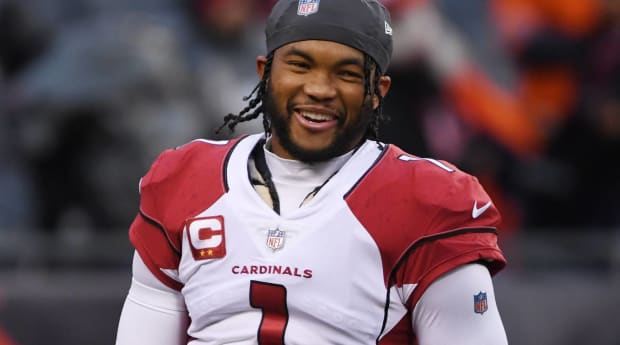The Cardinals handed quarterback Kyler Murray a five-year, $230.5 million extension on Thursday, ending months of fabricated drama that always seemed a tad ridiculous when getting to the heart of the matter: What were the Cardinals going to do without him?
Yet, again, the club placed itself at one of the most obvious negotiating disadvantages in recent memory. When they were trying to draft Murray in the first place, they forecasted as much to the entire NFL and then tried to trade Josh Rosen, the 10th overall pick in the 2018 draft. They ended up getting less (Miami’s No. 62 pick, plus a 2020 fifth-round selection) for Rosen then the Jets got for Sam Darnold (three draft picks) after showing the entire world that Darnold was unlikely to make it as a long-term NFL starter.

Quinn Harris/USA TODAY Sports
Now they built an offense and a team completely around the skill set of Murray and, by some extension, Murray’s head coach Kliff Kingsbury. They extended Kingsbury and Steve Keim, the general manager who hired Kingsbury, through the 2027 season. Still, the Cardinals allowed these negotiations to drag out through an offseason where Murray felt the need to scrub his social media account, and give two other quarterbacks (Aaron Rodgers and Deshaun Watson) the time and space to sign record-setting contracts that inevitably complicated Murray’s own negotiations. Still, Murray’s deal will pay him a higher annual salary ($46.1 million) than Watson ($46 million), while Watson gets more money guaranteed ($230 million).
Spare us if we are not still panting from the excitement. An accurate headline in this situation might read: Thirsty team pays premium for water. Murray may not be the best quarterback in the NFL, but he is the one of a select few quarterbacks who can make Arizona’s offense work as designed. His threat to run is essential to much of what the Cardinals do schematically. His ability to throw is essential to all of it. There was no market remaining for tradable veteran quarterbacks except for the 49ers’ Jimmy Garoppolo. Even Baker Mayfield, who knows Kingsbury’s system and would have represented some kind of twisted, hard-to-fathom leverage, was spoken for after a trade to the Panthers.
The better question, when considering the size and scope of owner Michael Bidwill’s investment in this current version of the roster: Are you sure about all of this?
While last year could be seen through rose-colored glasses as a breakthrough season, the Cardinals still collapsed down the stretch losing four of their last five games. They failed to secure the No. 1 seed despite starting the season 7–0. Kingsbury admitted at the scouting combine that, when DeAndre Hopkins tore his MCL in December, he should have been more creative in patching that hole. Hopkins will miss the first six games of this season due to an NFL suspension. Christian Kirk is gone, too, signing a free-agent deal with the Jaguars. The Cardinals spent a first-round pick on Hollywood Brown during this year’s NFL draft so they could manufacture the on-field speed threat they were never able to develop themselves. As a whole, the organization has struggled to develop premium picks. Outside of Murray, there are second-round picks Byron Murphy and Andy Isabella, 2020 first-round pick Isaiah Simmons, and 2021 first- and second-round selections Zaven Collins and Rondale Moore. While it might be too soon to evaluate this group as a whole, how does it look at this moment?
As editor Gary Gramling pointed out last year, the Cardinals were among the luckiest teams in football during their surprising start to the season. From Gary in October of 2021:
The Cardinals are converting a lot of third and very longs while also stopping opponents on fourth downs at an unsustainable rate (10 of 14 so far, league average usually hovers around 50%). They’ve recovered 18 of 23 fumbles (expected fumble recovery rate for any team is 50%). Between fourth-down defense and fumble recoveries they’re stealing two possessions per game so far. They’re the only team in football to have opposing kickers miss three attempts inside 50 yards, one of two teams to have opposing kickers miss four PATs, and are top 10 in offensive and defensive red-zone efficiency, typically a volatile stat unless you have a Derrick Henry on your roster. In many ways, it smells a bit like the 2020 edition—albeit with a better defense.
While most contracts can be backed out of (except for Watson’s fully guaranteed deal), the Cardinals see enough substance over three years with Kingsbury and Murray to tie the franchise around their hips until 2027.
The good news? They at least realized the importance of securing Murray until it was really too late. Until it came to a deep kind of wound that couldn’t be healed and Murray, like Russell Wilson or Matt Stafford, forced his way onto the open market. The current plan as designed may not work out. Last year may have been somewhat of a fluke occurrence. But if Bidwill needs to change course, he can always start fresh with one of the 10 best quarterbacks in the NFL.
There’s a victory for common sense if we ever saw one.
Watch Kyler Murray all season long with fuboTV: Start a free trial today!







